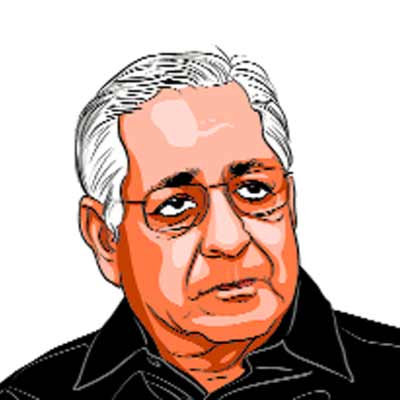Opinion Bigotry prevails at Jaipur festival
Ultimately Salman Rushdie did not or could not attend the Jaipur Literature Festival
Bigotry prevails at Jaipur festival
Ultimately Salman Rushdie did not or could not attend the Jaipur Literature Festival. The video link of his talk also did not materialise. The organisers of the Festival for pragmatic considerations yielded to implied threats of outbreak of violence if Rushdie attended and spoke at the Festival. Rushdie was not going to speak about the correctness of the ban nor read any part of The Satanic Verses. The critical issue is not about personalities viz. Salman Rushdie. It is about the principle which our Supreme Court enunciated in 1989 in the context of a Tamil movie,Ore Oru Gramathile,whose theme was perceived by some Dalit groups as hostile to the reservation policy and hurtful to Dalits. There were threats of burning the theatres which dared to exhibit the film. These concerns were cited by the State government to justify restraint on exhibition of the movie. The Supreme Court expressed its anguish at the States purported helplessness to deal with an apprehended law and order situation. The Court ruled that freedom of expression cannot be suppressed on account of threats of violence. That would tantamount to negation of the rule of law and surrender to blackmail and intimidation. Freedoms cannot be held to ransom by an intolerant group of people.
The message is clear. Tranquility ought not to be maintained in all cases by sacrifice of liberty. In order to prevent a potential threat to law and order,the State should not suppress fundamental rights which it is the duty of every democratic state to uphold. Instead the State should take action against those who indulge in intimidation and provide security to persons who wish to exercise their basic human rights viz. freedom of expression and freedom of movement. The State of Rajasthan apparently failed to put in place the requisite security measures. The regrettable consequence was not Rushdies absence but the prevalence of bigotry and intolerance. No heed was paid to our Supreme Courts pronouncement that freedom of expression protects not merely ideas that are accepted but those that offend,shock or disturb the State or any sector of the population. Such are the demands of pluralism,tolerance and broadmindedness without which there is no
democratic society.
Words can hurt
Pandit Nehru whilst moving the Objectives Resolution in the Constituent Assembly said that words are magic things often enough. Unfortunately,some words convey unmagical meanings to different persons and are perceived as derogatory and hurtful. The writer John Press tells us there are some words a poet fears to write. And that indeed is for good reason. Today you cannot and should not refer to a dark coloured person in the US as Negro. It seems that the word Black is also taboo. The politically correct term is African-American,stressing the heritage of these proud people. The Apache,Sioux and Cheroke tribes were usually called Red Indians without meaning any offence. The correct expression now is Native Americans to describe these indigenous inhabitants of the US. In the UK,it is offensive to refer to Indians,Pakistanis and Bangladeshis under the omnibus label of Pakis. The proper expression is South Asians. Non-ethnic sensitivities are also taken into account. Therefore,a garbage collector is now called a sanitation engineer. Calling a person mentally retarded is unacceptable. The correct term is mentally challenged. And you should not call a person fatty nor term a person shortie.
They should be described as horizontally challenged or vertically challenged as the case may be! Delightful euphemisms.
We generally do not bother about the sensitivities involved in the use of certain terms. There is no dearth of pejorative terms,for instance when we say Mallu for Malayalees,Madrasi for all South Indians,Chakkas for homosexuals,Chinki for our North-Eastern female citizens and Gujus for the inhabitants of Gujarat. Worse is calling persons of black colour,habshi. Incidentally,Parsis are not infuriated when called bawas,which they do not consider as pejorative. Problems arise on account of intolerance and hypersensitivity. Broad-mindedness and a sense of humour should govern our reactions rather than violent frenzy.





